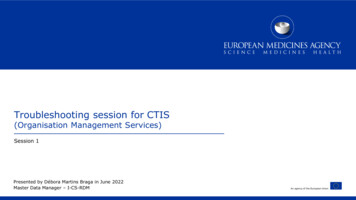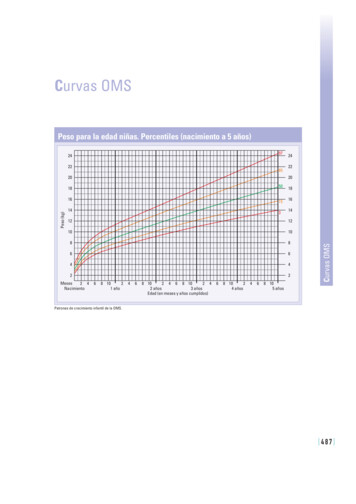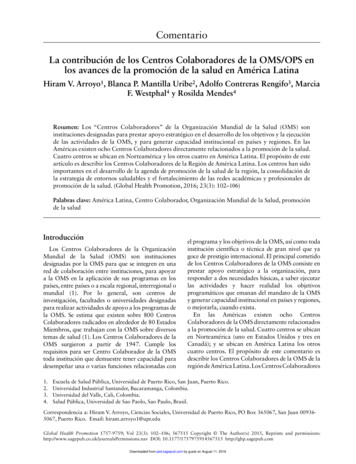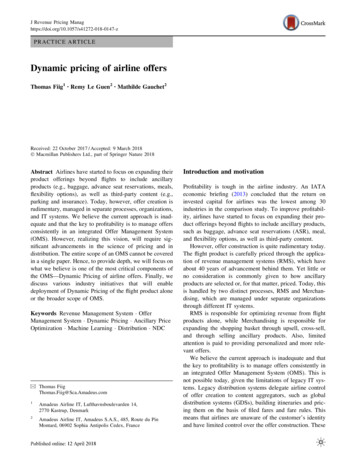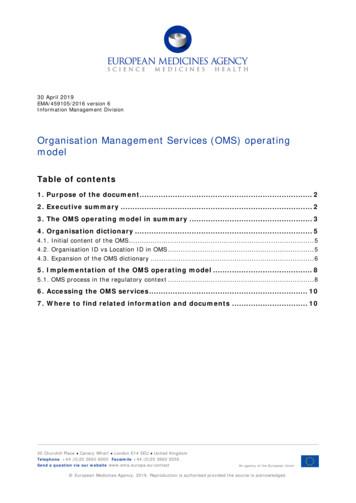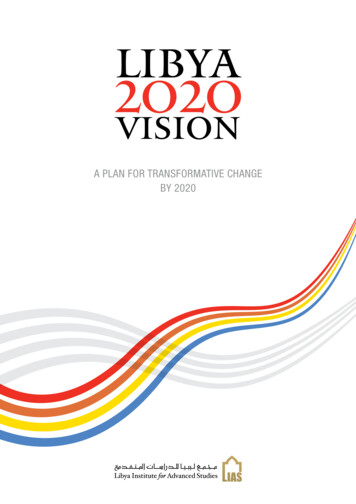
Transcription
a plan for transformative changeby 2020
contentsIntroduction to Libya Vision 2020The Need for Libya Vision 2020How Does Libya Vision 2020 Differ from Other Visions?Overcoming Challenges and Creating Change for a Better FutureLibya’s Transformation JourneyHow Libya Vision 2020 Was Developed2346810Foundations for Libya Vision 202012Peace, Security, and Rule of Law:Establishing a Safe and Secure NationBuilt on Law, Order, and Equitable Justice18Establishing and Maintaining Peace and SecurityStrengthening the Rule of Law and Ensuring Access to JusticeAchieving Long-term Peace and Stability Through National DialogueEconomic Development:Building a Prosperous, Productive,and Innovative NationGrowing and Diversifying the EconomyEnhancing Economic StabilityRebuilding National InfrastructureModernizing Agriculture for Food SecurityManaging Natural Resources Equitably, Sustainably, and TransparentlyHuman Development:Providing a Nurturing Environmentfor All LibyansEducating Our Youth to be Future LeadersIncentivizing Private Sector EmploymentProviding Quality Healthcare to AllCaring for Our CountryBuilding Strong and Prosperous CommunitiesPreserving Our Natural EnvironmentRebuilding Our National IdentityGood Governance and Public Sector reform:Creating an Efficient, Transparent,and Accountable oving Service DeliveryIncreasing Transparency and Accountability5860Implementing Libya Vision 202062libya vision 2020 1
The Need for Libya Vision 2020Though some progress has been made on consolidating peace andsecurity since the 17th of February Revolution, absence of effectivepolicies, legal and institutional frameworks, and lack of ownershipand accountability at different levels of leadership has compromisednational aspirations. While the driving force behind our nationbuilding experience so far has been our collective ambition forsocio-economic and democratic transformation, Libya can dobetter. We could achieve much more if we shared a well-definedvision to steer our collective efforts. There is a pressing need tointegrate our development policies and strive harder for our country’sfuture. Libya Vision 2020 is a call to action for all Libyans to rallybehind placing the country on a sustainable development path.In formulating a vision for Libya, we cannot dwell on lostopportunities and what we lack. We must adopt a forward-lookingapproach that critically reviews our institutions, policies, andexisting plans with confidence in our ability to learn from thepast and change. We have a rich history rooted in Islamic, Arab,and African values that has been shaped by a tradition of positiveengagement with other cultures and countries. Libya is not startinga nation from scratch but rediscovering its rich cultural and societalvalues that formed its foundation in the past. It is upon theseexisting foundations that Libya Vision 2020 was developed.Because little attention was paid to long term planning since1969, Libya has had a relatively short experience in developmentplanning. Previous national planning initiatives were developedwith mixed results, have constrained the country’s growthand development, and were poorly implemented. After fourdecades of autocracy, Libyans are demanding better waysforward and deserve a national development vision thataddresses their current and future needs and aspirations.Introduction toLibya Vision 20202 libya vision 2020While peace and security are pre-requisites for Libya’s future, thereis an equally pressing need to address Libya’s economic, humandevelopment, and governance challenges. However, the mostcritical challenge Libya now faces is developing in a participatorymanner, through dialogue and agreement, on a shared visionfor the future. Libya Vision 2020 is a work in progress to beshaped through public and institutional consultation, and weinvite all Libyans to participate in its ongoing development.libya vision 2020 3
How Does Libya Vision 2020Differ from Other Visions?There are several visioning exercises takingplace in Libya now. While all of theseefforts agree on the need to envision futurepossibilities and to advance the necessaryactions to convert possibilities into realities,they diverge in their assumptions regardingthe willingness of Libyans to wait formeaningful and visible progress. LibyaVision 2020 assumes that Libyans are notwilling to wait until 2030 or 2040 for change.Libyans want positive transformation now.Right now, security and the rule of law islacking. Right now, economic performanceis substandard. Right now, institutions thatpromote human development are weak.Right now, poor governance is compromisingthe rapidity and effectiveness of reforms.Libya Vision 2020 advances a frameworkwithin which national strategies andimplementation plans can be developed forcatalytic change by 2020. It is an attempt toformulate a shared national vision to assist inbuilding consensus on where Libya can be insix years. While this is a short time horizonfor change, Libya Vision 2020 reflectsthe nation’s aspirations, determination,and commitment for immediate socioeconomic and democratic transformation.4 libya vision 2020Realizable visions identify potentialopportunities to accelerate developmentand the challenges that must be overcome.For this reason, Libya Vision 2020 seeks toinstill humility, courage, and determinationto rise to challenges at the individual,community, and national levels. By offeringa shared vision focused on immediatechange, Libya Vision 2020 was conceivedto ignite people’s aspirations and serveas a catalyst that allows our country toshift gears towards reconstruction andrecovery as quickly as possible. LibyaVision 2020 serves as a message of hopeand inspiration for motivating individuals,communities, and the nation to worktogether to overcome challenges on thepath to sustainable development.libya vision 2020 5
Libya vision 2020Peace, Security,and Rule of LawPeace, security and the rule of law areprerequisites for sustainable development.Libya will only secure the dividends of the17th of February Revolution by preventingfurther conflict through reconciliation,professionalizing security institutions,ensuring equitable access to justice, andmaintaining law and order throughtransparent and accountable institutionsthat respect human rights and protectfundamental freedoms.EconomicDevelopmentLibya will build a diversified, private sectorled economy that will improve prosperity forLibyans in all regions of the country throughprivate sector development, job creation,economic stabilization, improvement ofcritical infrastructure, and more responsiblemanagement of resource wealth.HumanDevelopmentLibyans will be empowered and theircapacities developed to enable them to reachtheir full potential through access to qualityeducation at all levels, provision of qualitysocial and healthcare services, and sustainableurban development.Peace, Security,and Rule of LawEconomicDevelopmentHumanDevelopmentGovernance andPublic Sector ReformA safe and securenation built onlaw, order, andequitable justiceA prosperous,productive, andinnovative nationA nurturingenvironment for allLibyansAn efficient,transparent, andaccountablegovernmentTransformation projects implemented in each development pillar to turnLibya Vision 2020 into actionFOUNDATIONSBy the year 2020, Libya can be a stable,democratic, and prosperous nation wherecitizens enjoy a high standard of living.However, in order to achieve this, wemust overcome several challenges. LibyaVision 2020 is based on four key areasof progress, or development pillars, andfoundational values to advance a collectivevision for transformative change. The fourdevelopment pillars – Peace, Security, andRule of Law, Economic Development,Human Development, and Governanceand Public Sector Reform – form thefoundation upon which development plansfrom 2014 to 2020 will be built. Libya Vision2020 translates the development pillarsinto a statement of achievable objectivesaccompanied by transformation projects,which are key initiatives that will beimplemented to turn Libya Vision 2020 intoaction. The Vision serves as a framework toguide critical analysis of constraints that needto be overcome and provides a reference forlogical and sequential implementation. Thisapproach differs from ad-hoc approaches thathave been pursued in the past by advancing areform framework that focuses on immediatesteps towards long-term solutions.A stable, democratic, and prosperous Libya where citizens enjoy a high standard of livingpILLARSOvercoming Challenges andCreating Change for a Better Science,Technology,and InnovationHumanResourcesDevelopmentPublic SectorExcellenceGovernance andPublic Sector ReformLibya will build a democratic, transparent,and accountable government at both thenational and municipal levels that will bemanaged by professional and committedpublic servants.SUBMIT YOUR IDEALibya Vision 2020 is an invitation to express your views on matters that affect us all as Libyans to helpshape the future of our country. Do you have feedback on a particular government policy? Is there an issuein your community that needs to be addressed? Do you have an idea for an alternative approach thathasn’t been considered?Submit your idea for a transformation project at libyavision2020.ly6 libya vision 2020libya vision 2020 7
libya nowLibya’s TransformationJourneyLibya Vision 2020 will be implementedin two successive phases. The firstphase covering 2014–2016 will focuson stabilization and reconstructionthrough national and local dialogue andreconciliation in parallel with pursuingpriority economic, human development,and public sector reforms. The second phasecovering 2017–2020 will focus on sustainablegrowth by developing a consistent approachto managing ongoing conflicts, privatesector development, investing in large-scaleinfrastructure programs, and structuralreforms to ensure an accountable, meritbased, performance-oriented public sector.Transformation projects are large-scaleinitiatives intended to catalyze change andare included to support the implementationof Libya Vision 2020. These projects arebased on learnings from our nation buildingexperience thus far and will be pursuedin a phased approach to fundamentallytransform the country by 2020. Whileprevious government efforts provide abase to build on and there are ongoinggovernment initiatives that deservecontinued support, transformation projectswill go further by specifically focusing onkey constraints that need to be overcomefor a stable, democratic, and prosperousLibya. Transformation projects are aimed atactivating a paradigm shift from stabilizationand reconstruction to recovery and growth.Libya Vision 2020 defines broad outcomesfor the country as a whole which providea framework for national strategies andimplementation plans. In collaborationwith key stakeholders, detailed strategicand operational plans for 2014–2016articulating specific goals, strategies, andperformance targets will be developed.At an appropriate stage, another plancovering 2017–2020 will be produced.Peace, Security,and Rule of LawEconomicDevelopmentHumanDevelopmentGood Governance andPublic Sector Reform Libyans unable to livetheir lives, earn a living,and raise families inpeace Lack of institutions andtrained personnel Legal frameworksprevent rule of law Armed conflict,assassinations, andattacks on property Government entitiesdominate the economywith low private sectorinvolvement High dependence onthe hydrocarbon sectorresulting in fiscaluncertainty Poor and decayinginfrastructure whichlimits economic growth Education systems notproducing skills requiredby labor market Poor access to qualityhealthcare Poor quality of life dueto haphazard planningat the national and locallevel Limited access toessential public servicesand poor quality serviceprovision Unclear andnontransparentmechanisms for publicspending with arbitrarybudgeting mechanismslibya 2014–2016Stabilization and Reconstruction Vision Security sector reformthat prioritizes thedevelopment andimplementation ofpolicies Fundamental rightsguaranteed by lawand defended by stateinstitutions Link between adherenceto peace and involvementin the body politicestablished Public privatepartnerships establishedin key sectors withpotential for employmentcreation Fiscal policy measuresin place to limit budgetvolatility Key infrastructurerehabilitated and regionaldisparities addressedlibya 2017–2020Recovery and Growth Vision Security forces under aunified command withoversight by civilianauthorities Transparent, accountablejudicial systems thatrespect human rights andfreedoms Mechanisms in place toproactively manage andcontain conflicts8 libya vision 2020 Little progress made towards stabilizing country Disjointed economic, human development, andgovernance reforms Key constraints to privatesector developmentassessed and addressed Framework for governingpublic finances linked todevelopment planning Resource mobilization fornational and municipalinfrastructure projectssecured throughinstitutional financing andcapital markets Pursue stabilization measures alongside economic,human development, and governance reformssupported by transformation projects Key barriers to achievingquality educationaddressed Improved service deliveryin existing healthcarefacilities Enhanced standard ofliving due to expandedcommunity supportmechanisms Local government entitieshave the necessarymandate and tools toprovide essential services Oversight mechanismsfor transparency andaccountability in place Checks and balancesin place to ensuredemocratic processes areprotectedfoundations Continued focus on economic, human development,and governance reforms for recovery and growth byscaling transformation projects Labor market needslinked to educationsystem Healthcare system moreresponsive to local needsand universal insurancein place Prosperous communitiesthat are in harmony withthe natural environmentand supportive of themost vulnerable Customer orientedservice delivery at thenational and municipallevels An accountable, meritbased, performanceoriented public sector Expanded involvement ofcitizens, civil society, andindependent media in thedemocratic processlibya vision 2020 9
How Libya Vision 2020Was DevelopedLibya Vision 2020 was developed by aworking group of Libyan citizens who servedLibya in different capacities during the 17thof February Revolution and continue to beengaged in defining the nation’s future. Thegroup includes previous members of theLibya Stabilization Team, which was taskedwith preparing a comprehensive stabilizationplan for Libya after its liberation, as wellas experts in several fields of importanceto Libya’s development including security,economics, finance, education, social policy,healthcare, and public sector management.Libya Vision 2020 is based on extensiveconsultations involving the participationof civil society organizations, communityleaders, business leaders, entrepreneurs,academics, students, professional groups,women and youth associations, and media.Consultative forums were held in urbanand rural centers throughout Libya andwith the Libyan diaspora abroad. Theobjective of these consultations was to gainnational consensus on the key challengesthat impede Libya’s progress and potentialstrategies to create a better future by 2020.Proposed transformation projects, whichhave the potential to resolve key security,economic, human development, andgovernance challenges, were incubated in asimilar consultative process. Transformationprojects present workable solutions tothe problems Libyans face today based10 libya vision 2020on consensus from national consultationsand the experience of countries whichhave undergone similar transformations.Unlike previous development planningattempts, Libya Vision 2020 is ownedby Libyans and its implementation willbe stewarded by them. The participatorymanner in which Libya Vision 2020 wasdeveloped will also be emphasized in itsimplementation. Since Libya Vision 2020 isa work in progress, an online citizen portal,called the Libya Vision Citizen Portal, hasbeen developed to give all Libyans a wayto engage with each other on the issuesthat matter to them. The Libya Vision2020 Citizen Portal provides a way topetition leaders to take action on a rangeof important issues facing our country bysuggesting transformation projects andcommenting on progress towards our 2020goals. If a proposed transformation projectreceives enough support or citizen commentsrecommend a different course, we willreview citizen feedback and issue an officialletter to the government requesting action.We invite all Libyans to play a part in thisongoing dialogue to bring transformativechange to Libya. In this way, Libya’s futurewill be owned and sustained by its people.libya vision 2020 11
Rediscovering Our RichCultural and Societal ValuesSince the 17th of February Revolution, Libyans have witnessedseveral poorly implemented reform plans. This has led Libyans to beskeptical of the government’s ability to lead transformative change.Yet, our country’s history is replete with examples of triumph overadversity and our ability to embrace profound change. In confrontingsignificant challenges and change in the past, our cultural fortitudeand societal values have always been a sources of strength andguidance to inform difficult choices. Our cultural and societal valuesare still valid as guiding foundations today and must be rediscoveredto confront present challenges and embrace change once again. Ourlong-held cultural and societal values discussed below serve as guidingfoundations for the four development pillars of Libya Vision 2020and are crucial to the implementation of all programs.RootednessThe Foundationsfor Libya Vision 202012 libya vision 2020Libya Vision 2020 envisions an environment in which all Libyanspositively contribute to national development. Our nation willprosper through the development and empowerment of all citizens.However, Libya cannot evolve until we have a united and inclusivenation where individuals and communities have a sense of commonand shared identity and destiny. Libya must become a nation thatis aware and proud of its rich spiritual, cultural, and social heritage.This awareness and appreciation of our history and the transmissionof our values to future generations forms the foundation for anintegrated, peaceful society with loyalty and dedication to the futureof our nation. A renewed sense of Libyan identity will create aconfident society which is proud of its achievements and resilient towhatever challenges the future may hold.libya vision 2020 13
Our long-held cultural and societalvalues serve as guiding foundationsfor the four development pillars ofLibya Vision 2020OpennessWhile Libya has suffered from fourdecades of self-imposed isolation due toa confrontational foreign policy agenda,rebuilding cooperative relationships withregional and international partners isrequired to realize the accelerated reformsoutlined in Libya Vision 2020. We have along tradition of engagement with othercountries and cultures, and we should drawon that rich history. Recalling our cultureof openness, Libya can develop by adoptinginternational good practices while havingthe courage to discard out-of-date attitudesthat deter progress and undermine nationalunity and strength. Globalization createsunprecedented opportunities for progressand prosperity which transcend Libya’sboundaries and can only be accessed throughstrong trade and investment relationships.International and intercultural dialogue canalso help us galvanize action that preventsisolationism and extremism. Libya will playa constructive role within the frameworksof the Arab League, Organization of IslamicConference, African Union, and the UnitedNations. As an active member of theinternational community, Libya must striveto contribute to international economicdevelopment, peace and security, combattingtransnational crime, and addressing globalenvironmental change. Closer relationshipswith bilateral and multilateral developmentpartners will expand our participation in14 libya vision 2020international conventions, agreements,and treaties and open up opportunitiesfor international cooperation. Productiveengagement with bilateral and multilateralorganizations will allow us to more effectivelyalign development assistance with nationalpriorities identified in Libya Vision 2020.Forging a productive, outward-lookingforeign policy orientation will also allowus to reengage with Libyans abroad. ManyLibyans who attended higher educationabroad have not returned to Libya but retainstrong personal and business links with theirhome country. We must develop effectiveprograms to encourage Libyans living abroadto contribute their skill sets towards thereconstruction efforts of the country andhelp in rebuilding our national identity.HumanRightsHuman rights refer to the civil, political,economic, and social rights and freedomsall Libyans are entitled to. Human rightsinclude a range of rights such as freedomof expression, freedom of assembly, theright to an adequate standard of living, theright to adequate food, housing, water, andsanitation, and the right to education. InLibya today, there is a weak security sector,an underdeveloped criminal justice system,lack of checks and balances to monitorabuses, and a lack of public awareness aboutindividual rights. These conditions have ledto human rights violations.Securing rights is essential in forminga foundation for the nation’s progressthat includes not just physical securitybut also safeguarding social, political,economic, and civic rights.GenderEmpowermentDuring the 17th of February Revolution,women worked alongside men as equals inpursuit of a common goal. The transformativechanges outlined in Libya Vision 2020requires a similar level of social cohesionthat will be difficult to achieve if women areexcluded from economic, social, and politicallife. Libya Vision 2020 includes gender equityas a foundation for all programs. This willrequire us to examine laws, political processes,and labor market and educational policies toensure that women can thrive and participateequally in Libya’s transformation journey.YouthEmpowermentYouth under the age of 35 make up themajority of the population. Addressingissues facing Libya’s youth is crucial toensuring reconciliation and responding tothe challenges that face our country. Accessto education, healthcare and social services,employment opportunities, and awareness ofour cultural heritage are critical for enablingour youth to realize their full potential. Youthmust also be engaged in political and civicdiscourse to ensure they take ownership of thefuture that they will be tasked with leading.VeteranInclusionDuring the 17th of February Revolution,thousands of men and women answered thecall to liberate the country by selflessly riskingtheir lives. Political rhetoric that has stressedrespect for martyrs and expressed concernfor those injured has not led to the supportveterans need to overcome the physical andpsychological injuries they sustained duringthe conflict. The significant contributionsmade by veterans during the 17th of FebruaryRevolution necessitate that we ensure theyhave access to healthcare, education, andcareer transition assistance. However, Libyalacks sufficiently trained social and healthcarespecialists who can accommodate the medicalneeds of veterans to help them reintegrateback into society and reenter employment.Research and advocacy must also be used toeducate the public about the value of veterans’contribution to society and assert their rights.DisabilityRightsAs a country that had to endure conflict tosecure its future, Libya must ensure equitableeconomic, political, and social opportunitiesfor its citizens who suffer from disabilities.Our struggle for socio-economic anddemocratic transformation has unfortunatelyled to widespread impairments such as lossof limbs, loss of sight, psychological trauma,and other disabilities. In some nations,the disabled are socially stigmatized andsuffer from public misconceptions on theircapabilities. As a nation, we must worktowards overcoming societal, physical, andinfrastructural barriers that prevent thedisabled from living long and productive lives.libya vision 2020 15
Science, technology, and innovation arecatalysts for social progress and thebasis for a prosperous economyScience, Technology,and InnovationAchieving the goals of Libya Vision 2020requires a society that is innovative andforward looking. Rather than being solelya consumer, we must aspire to also be acontributor to scientific and technologicalinnovation. Science, technology, andinnovation are catalysts for socialprogress and the basis for a prosperouseconomy. Libya must develop a science,technology, and innovation frameworkthat channels resources to scientificresearch, research and development,improving the technical capabilities ofthe national workforce, and in raising thequality of teaching in science, technology,engineering, and mathematics fields.Human ResourcesDevelopmentA highly educated and skilled workforceis critical to enabling Libya to effectivelycompete in the regional and global economyas well as offer high quality public andsocial services. A culture of lifelong learningwhich values human development througheducation will be required to raise laborproductivity and secure our future.16 libya vision 2020We must ensure alignment betweennational education and training systemsand our economic development ambitionsthrough more effective coordinationof institutions involved in humandevelopment, alignment of macroeconomicpolicies with our education system,and ensuring opportunities for lifelonglearning are inclusive and accessible.Public SectorExcellenceA professional, committed civil service isrequired to build a more citizen-focusedand performance-oriented public sector.As the largest employer in Libya, thepublic sector determines the rapidity,efficiency, and ultimate success of reforms.Therefore, the quality of the public sectorin terms of its accountability, effectiveness,and efficiency in administration, servicedelivery, and management, is of utmostimportance to the country’s future. Inimplementing Libya Vision 2020, ministryand agency performance managementmust be linked to execution to ensurecollective progress towards our 2020 goals.libya vision 2020 17
Establishing a Safe and SecureNation Built on Law, Order,and Equitable JusticeWithout establishing a peaceful society, Libya’s political, human, andeconomic development will continue to be stalled by conflict. Peaceand security are necessary to ensure Libyans the freedom to pursuedaily activities without fear and to enable the government to deliveressential services to citizens. Activities such as sending children toschool without fear for their physical security, going about dailyactivities without fear of being targeted for political leanings or tribalaffiliation, accessing government services without fear of being avictim of indiscriminate violence, and starting a business without fearof attack or extortion are basic rights all Libyans deserve.Peace, Security,and Rule of Law18 libya vision 2020In addition to physical security, the fundamental freedoms thatLibyans fought for, such as the opportunity to live in a free society inwhich all citizens have the right to free speech, freedom of association,and access to justice, must be safeguarded. For this reason, LibyaVision 2020 advances a plan to ensure the security of citizens andstate assets through the provision of an integrated national securityinfrastructure and policies that guarantee the rule of law andprotection of fundamental rights and freedoms.libya vision 2020 19
Establishing and MaintainingPeace and SecurityOver three years after the 17th of FebruaryRevolution, the Libyan government isstill struggling to establish control andrein in armed groups. Some of thesegroups have used force against citizens,foreigners, politicians, state institutionsand assets, religious monuments, andrival groups. Experience from other postconflict countries shows that establishingpeace and security often requires a strong,professional, non-partisan security force.To effectively address insecurity, Libyamust form a security force under a unified,state controlled command structure that issubject to oversight by civilian authorities.As Libya transitions from establishing tomaintaining peace and security, it mustbalance the interim need to quickly reactwith force to illegal challenges to thestate and violence against civilians witha long term, proactive plan to preventfuture violent conflicts from erupting.Preventing future outbreaks of violencewill involve the development of a longterm engagement policy with municipalsecurity forces and provision of materialsupport from national institutions tomunicipal forces when combatting illegalmilitias. Such an approach will empowermunicipalities to respond to local threatswhile building public confidence andincreasing accountability and legitimacy ofnational and municipal security institutions.Maintaining peace and security willrequire Libya to systematically reorganizeand rebuild its police force, armedforces, and all other security forces intoprofessional and capable institutions.Security sector reform must prioritizethe development and implementationof policies concerning national security,national policing, community policing,disaster management, and governance ofthe relationships between different stateactors involved in the security sector.Libya’s porous borders and lack of sufficientborder control pose major securitythreats. Illegal trafficking of humanbeings, drugs, weapons, and subsidizedcommodities fue
future. Libya Vision 2020 is a call to action for all Libyans to rally behind placing the country on a sustainable development path. In formulating a vision for Libya, we cannot dwell on lost opportunities and what we lack. We must adopt a forward-looking approach that critically reviews our institutions, policies, and

